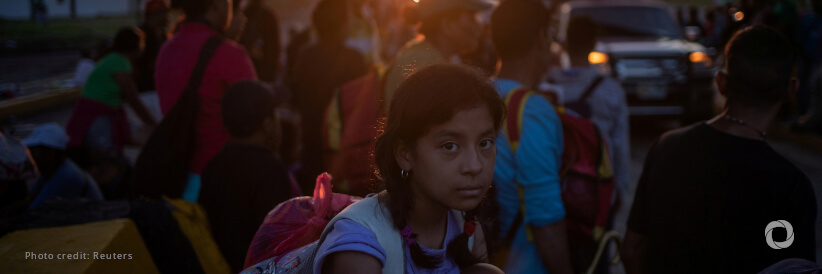People across Latin America fleeing violence face movement restrictions, exploitation, and asylum barriers, according to a new report by Norwegian Refugee Council (NRC), the Danish Refugee Council (DRC), and partners through the ProLAC initiative.
One in four families interviewed for the report said that their lives would be at risk if they returned to their place of origin.
“It’s alarming that so many people across Latin America would face life-threatening risks if they were forced to return to their place of origin,” said Stine Paus, regional director of NRC in Latin America. “Displaced people whose lives have already been shattered by violence must be better supported by the international community where they are. They cannot be forgotten in these times of cuts to aid budgets.”
“We need to see better international protection for those in need. This means giving displaced people whose lives are at risk a safe place to live, where they can enjoy basic rights, live freely, and eventually overcome their vulnerable situation. Instead, various countries in the Americas continue to limit access to asylum and are deporting refugees and migrants without first assessing whether their lives would be at risk.”
Without the opportunity to enter a country using a formal route, refugees and migrants are forced to take irregular routes as they seek safety and better opportunities. These routes are often incredibly dangerous and sometimes facilitated by smugglers. Half of the families interviewed said they experienced abuses during their journey, with extortion particularly prevalent in Peru, Guatemala, and Mexico. Among the families reporting abuses in Mexico, 40 per cent cited being kidnapped to be extorted for money.
In their quest for a new beginning, refugees and migrants face discrimination and xenophobia, which further complicate their attempt to find safety and integrate into society, forcing some to flee yet again. Women and girls are particularly vulnerable to gender-based violence throughout their displacement.
“Women and girls face the brunt of abuse, and we must address their specific needs. We need to improve access to information and our ability to respond to gender-based violence, especially for the most vulnerable groups,” said Yann Cornic, regional operations director for DRC in Latin America.
Internal displacement remains a pressing issue across Latin America. People who flee their homes in search of safer locations but remain within their countries also need protection. In the first months of 2025, intensified violence in Colombia’s El Catatumbo region led to the displacement of over 56,000 people. Countries including Guatemala, México, and Ecuador are also grappling with internal displacement, yet often lack the necessary frameworks to protect those affected.
“Ongoing rates of internal displacement underscore the urgent need for comprehensive data and legislation to ensure safety and support for displaced individuals within their borders,” said Cornic.
“National governments should take immediate action to ensure the protection of displaced people. Providing safe access to asylum, protecting people from the dangers they have fled from, and ensuring their rights are respected are essential steps to help them rebuild their lives. UN agencies, civil society organisations and donors also play a key role,” said Paus.
“Addressing the challenges faced by displaced people in Latin America requires political will and coordinated efforts, and commitment from both national and international decision makers. It’s time for us to come together and make a difference. We cannot turn a blind eye to the suffering of displaced people in Latin America.”

